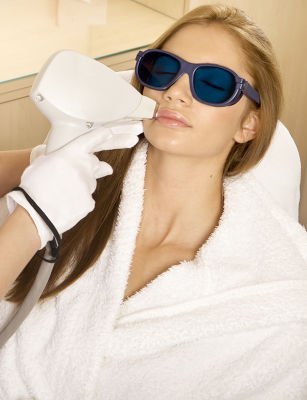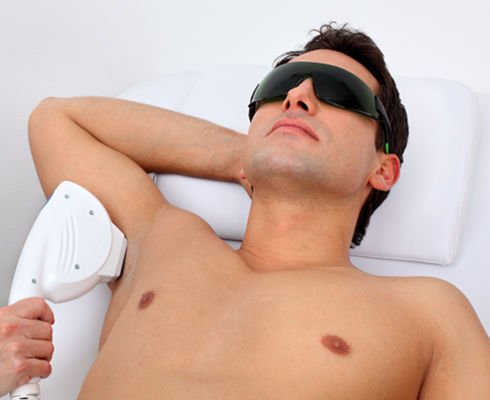It involves the heating of the hair matrix (responsible for hair production), rendering the follicle incapable of producing hair. The laser does not damage the skin or cause pain and can be applied all through the body and face alike. It is an “apparently” very simple technique. However, laser epilation must always be carried out by trained specialised physicians.
The latest studies have confirmed the success of this technique: 95% of patient satisfaction (both in men and women) and hair clearance of over 90% in all cases.
 The first consultation is free and carried out by specialised doctors. An accurate diagnosis of the case is established and a decision made regarding the most appropriate type of laser for the patient’s skin type and area to be epilated.
The first consultation is free and carried out by specialised doctors. An accurate diagnosis of the case is established and a decision made regarding the most appropriate type of laser for the patient’s skin type and area to be epilated.
Once this information is compiled, the doctor decides on the most convenient time interval between sessions and the patient is given a closed estimate (package price) that will include all sessions that might be required in each particular case, without limitation on the number of sessions or length of treatment.
The percentage of men has gone up in the last two years. Now, nearly 20% of our patients are men. Their preferred areas are the back, beard and space between the eyebrows.
In women, on the contrary, the most requested areas are: groin area or bikini line, armpits, legs and face, in that order.
At Instituto Médico Láser we have a variety of lasers. We choose the most appropriate one in each case based on the particular characteristics of the hair and skin. Different lasers are used on a rota basis on the following sessions to complete the level of efficacy, as normally not all hairs are eliminated with one simple laser system.
It depends on the area, but the number of sessions on average is between 6 and 8.
The areas with the best results are the armpit area and groin or bikini line area, with over a 85% hair clearance in just three to four spaced sessions. This is due to the fact that the total hair density to be eliminated is stable and, under normal physiological conditions, women do not grow new hair in the mentioned areas.
These patients continue to be treated at 3 to 4 month intervals and the expected outcome for them is to achieve the desired results in a total of 12 sessions, slightly over the 6 to 8 sessions required on average. It should be taken into account that the number of sessions and the extension of the follow up time are contingent upon the skin’s sensitivity, the degree of tolerance to the discomfort caused by the laser, the type of melanin in the hair, and the depth of the hair, as well as patient’s gender.
In male patients, the most resistant areas are the back and the beard. This is due to the peculiar matrix that hair follicles present in these areas and the influence of hormone levels that condition hair growth. These areas are heavily populated by hair, and thus twice as many number of sessions are normally required to achieve the desired results.

Yes, they are. Each patient is assessed individually and a diagnosis made. Skin type and hair type are determined and the most appropriate laser selected, with a scheduled sessions at set time intervals.
The patient is given a closed price that includes all sessions that the patient might need, without limitation on the number of sessions or the treatment duration.
Yes, there is. Diode and Neodymium YAG lasers are more appropriate. In other words, lasers with longer wavelengths are the safest for suntanned skins and in general for all skin types that might be exposed to the sun in summer months. If the patient is not going to be exposed to the sun, any of the lasers available would be appropriate.
Besides being a pain-free, long lasting and comfortable treatment, laser hair removal does not present any contraindications and in many cases, it resolved other skin problems such as folliculitis (embedded hairs) in the groin area and in the legs.
In women with hormonal imbalance, laser hair removal is one of the most effective solutions against the production of hair, being preferable to hormone therapy that causes undesirable side effects.
Would you like more information about laser hair removal? Contact Instituto Medico Laser now.